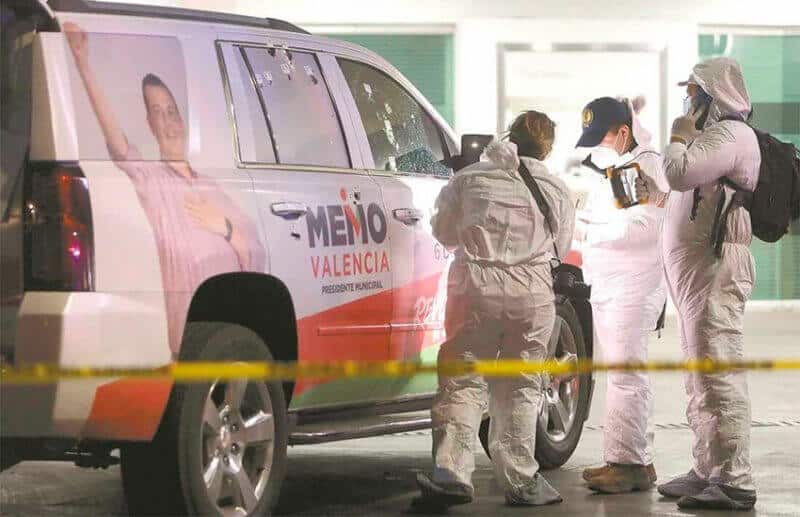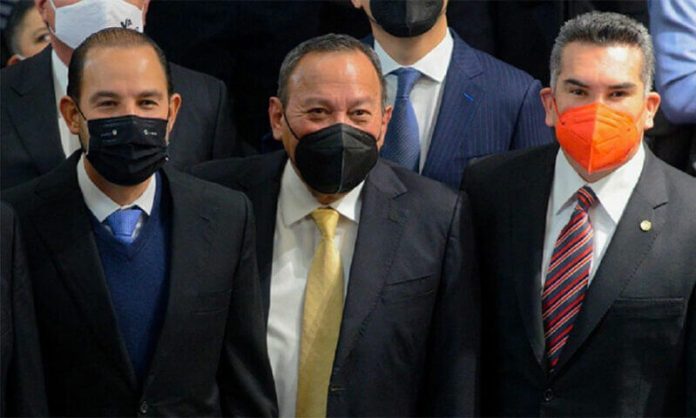The leaders of three opposition parties were in Washington D.C. on Monday to submit a complaint to two international organizations that the June 6 elections were unduly influenced by organized crime.
Marko Cortés of the National Action Party (PAN), Alejandro Moreno of the Institutional Revolutionary Party (PRI) and Jesús Zambrano of the Democratic Revolution Party presented their complaint to the Organization of American States (OAS) and the Inter-American Commission on Human Rights (IACHR), an autonomous organ of the OAS.
The three parties contested the June 6 elections – which came at the conclusion of the most violent electoral season on record – as part of an alliance known as Va por México (Go for Mexico).
The ruling Morena party was easily the most successful party in the outcome, although it lost its supermajority in the lower house of federal Congress.
The newspaper El Universal, which has seen the 57-page complaint, said the PAN, PRI and PRD leaders planned to ask the OAS to send a committee of observers to Mexico to investigate their claim that organized crime intervened in the elections to an unprecedented level. The three men subsequently took the same complaint to the IACHR.
Criminal groups “supported, installed, censured and murdered candidates in the majority of the country’s states” during the lead-up to the elections, the complaint says.
Cortés, Moreno and Zambrano met with OAS general secretary Luis Almagro and were due to meet with IACHR executive secretary Tania Reneaum later on Monday to discuss their claims.
Cortés described the meeting with Almagro as “very good,” while Zambrano said the OAS chief is “very worried about what is happening in our country” and committed to closely study the complaint submitted to him.
“… We will not allow Mexican democracy to be placed at risk,” Moreno said on Twitter above a photo of the three party leaders with Almagro.
The PAN, PRI and PRD assert that principles contained in the Inter-American Democratic Charter were blatantly violated during the process leading up to the elections, and people’s right to democracy was impinged upon as a result. The charter states that governments have an obligation to do all they can to defend democracy.
Their complaint, El Universal said, details a range of electorally-motivated crimes including homicides, kidnappings and intimidation of both candidates and everyday citizens.

It refers in depth to criminal interference in elections in seven states where it was especially bad or there were particularly high-profile cases of political violence: Sinaloa, México state, Guerrero, Michoacán, Guanajuato, Veracruz and San Luis Potosí.
The complaint also mentions the appearance of a decapitated human head at a polling station in Tijuana on the morning of June 6.
“The image of this severed head with open eyes was the perfect metaphor for the interference of organized crime, not just on the day of the elections at which 20,500 federal, state and municipal positions were up for grabs, but also during the months that preceded them and the days that have followed,” it says.
“For months, the warnings of threats, kidnappings and murders suffered by the candidates to these positions carried the warning that violence and criminal coercion were going to be present like never before in these elections, the largest ever of the young Mexican democracy.”
The complaint also states that “armed groups kidnapped and immobilized complete campaign teams, seized polling stations and forced citizens to emit their votes publicly and on their orders.”
“… Thousands of citizens who were victims of this violence were forced to keep quiet. Lawyers preferred to abstain from processing electoral coercion complaints …” it says.
The complaint says there were a total of 693 victims of electorally-motivated violence during the 2020-21 electoral period, an increase of 68% compared to the 2017-18 period.
Noting Morena’s strong performance at the election in Pacific coast states, opposition parties and some media commentators previously suggested that the ruling party had struck a deal with organized crime groups to win power there.
Speaking at his regular news conference on Monday, President López Obrador said he was completely unconcerned about the opposition parties’ decision to file a complaint with the OAS and the IACHR in the United States capital.
“… They’re very desperate,” he said before adding that they have the right to present their accusations.
“It’s legitimate for them to criticize us, to make accusations at international organizations as long as they act peacefully, … it’s for the good of the country, that’s the way democracy is everywhere.”
With reports from El Universal
